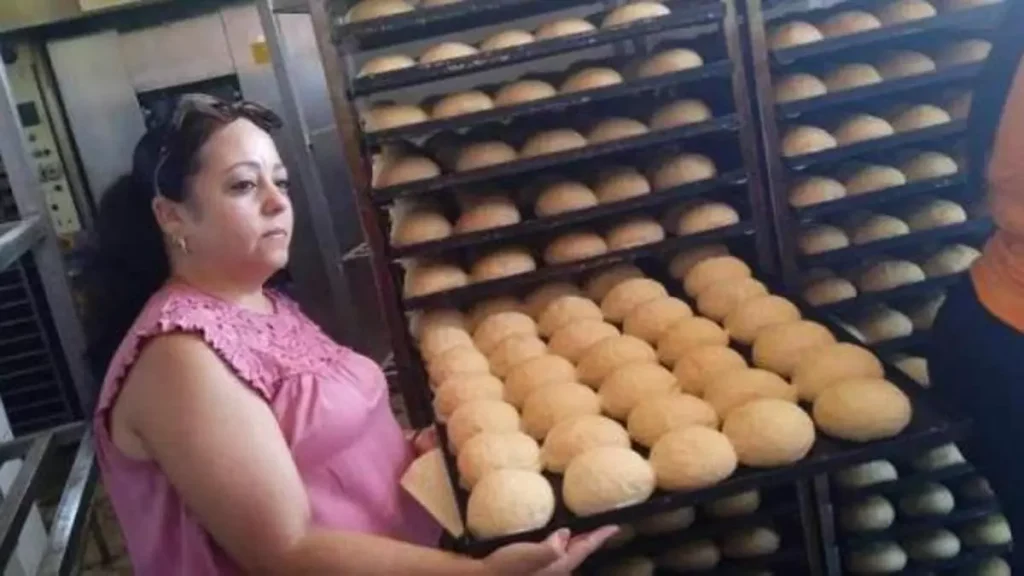In collaboration with Spain, experts from Cuba Energía seek to replace diesel by moringa biomass in the bakeries

![]() 14ymedio, Madrid, October 6, 2025 — The bakeries in Havana are preparing to work with moringa biomass and solar panels. The method has been successfully tested at Panadería Dulcería Línea y 12, located in El Vedado, and its workers claim that the specialists have certified the hot dog bun used in the experiment as a quality product.
14ymedio, Madrid, October 6, 2025 — The bakeries in Havana are preparing to work with moringa biomass and solar panels. The method has been successfully tested at Panadería Dulcería Línea y 12, located in El Vedado, and its workers claim that the specialists have certified the hot dog bun used in the experiment as a quality product.
Canal Caribe reported on the project this Sunday, saying it will save huge amounts of diesel and gas for the food industry. “Daily, this oven that we are going to see now consumes daily about 80 kilos [over 175 pounds] of diesel at the minimum. So, multiply that by 385 days, and that’s going to be the result we’re going to get,” said C. Alfredo Curbelo Alonso, a researcher at Cuba Energía.
These quantities, in each bakery of the country, amount to a strong economic outlay, dependent, moreover, on the availability of the resource. Instead, this project involves the start-up of ovens from another type of fuel: moringa pellets. The invasive plant is one of the few things that abound in Cuba, and this idea sparked a collaboration with Spain, through companies and the University of Zaragoza with the International Development Cooperation Agency.
These amounts, in each bakery of the country, amount to a strong economic outlay, dependent, moreover, on the availability of the resource
The research for the project began in 2022, as announced by the Spanish Biomass Association, through the Energy Resources and Consumption Research Center, which tested the suitability of moringa biomass, the system and process of converting its woody remains into pellets and its potential, among other things. This allowed the first factory of this type in Cuba to open in October 2024.
In a note published on the occasion of the opening of the center, the Spanish association stated that the woody remains of moringa “with its rapid growth and multiple applications” would be transformed. Instead of being discarded, it would be used as a source of heat. The company Ecofricalia contributed the biomass-specific moringa pellet plant, and the company Biocurve provided the biomass boilers.
“Thanks to the use of biomass, the drying process is done with a lower energy cost compared to the electrical system that was being used,” said the press release. This would guarantee, a priori, the supply to the bakeries resulting from the agreement with the Ministry of Food Industry and Cuba Energía. “Cuban experts and researchers emphasize the validity of this proposal in view of the energy crisis facing the country. In addition, they value its importance in exceptional situations such as those caused by meteorological phenomena,” states the report.
The report explains how the use of wood pellets, which have a high burning power and are very easy to handle, has become widespread. Researcher Curbelo Alonso points out that what is going to begin in bakeries could be extended to other larger industries, although in this case it will be necessary for the pellets to be made of wood chips, “a little easier to produce and more difficult to handle, but worth it.”
The goal is to transform the energy matrix using an abundant resource. Last week, in an interview with Bloomberg Line, the expert at the University of Texas Jorge Piñón recommended precisely the use of biomass in Cuba as a substitute for the expensive domestic crude, of poor quality, although he proposed the cane as the raw material base.
The report also mentions the possibility of installing photovoltaic panels in all the bakeries in the country wherever possible
The report also mentions the possibility of installing photovoltaic energy panels in all the bakeries in the country wherever possible, so that baking could be carried out during the hours of sun. “This is an integral project that is now in the investment plans, which we are preparing for 2026, on the roofs of bakeries that have the right conditions,” adds the engineer. He ensures “continuous production for the population, without interruptions due to lack of diesel.”
The shortage of flour and the poor condition of the mills have caused another crisis on the Island: the bread is of poor quality and shrinking in size. To this is added the lack of electricity, which often puts the production of the product at risk, even provoking a panic in the population that desperately seeks to get hold of it. This leads not only the authorities but the bakers themselves to rationing the sale on several occasions, even in private businesses.
Translated by Regina Anavy
____________
COLLABORATE WITH OUR WORK: The 14ymedio team is committed to practicing serious journalism that reflects Cuba’s reality in all its depth. Thank you for joining us on this long journey. We invite you to continue supporting us by becoming a member of 14ymedio now. Together we can continue transforming journalism in Cuba.
